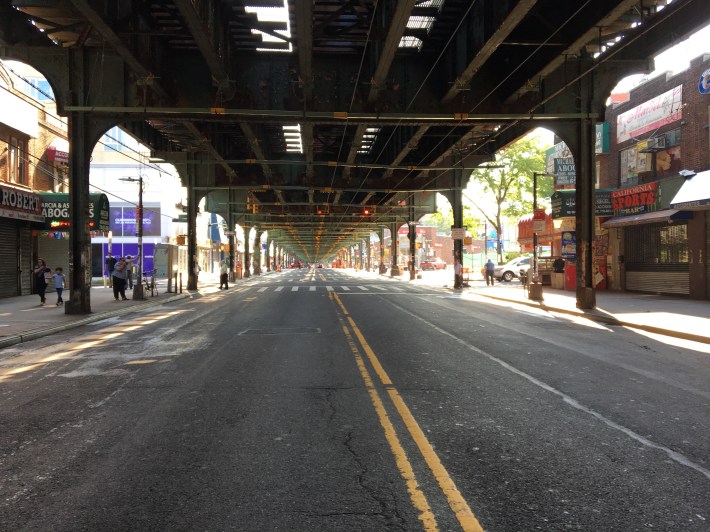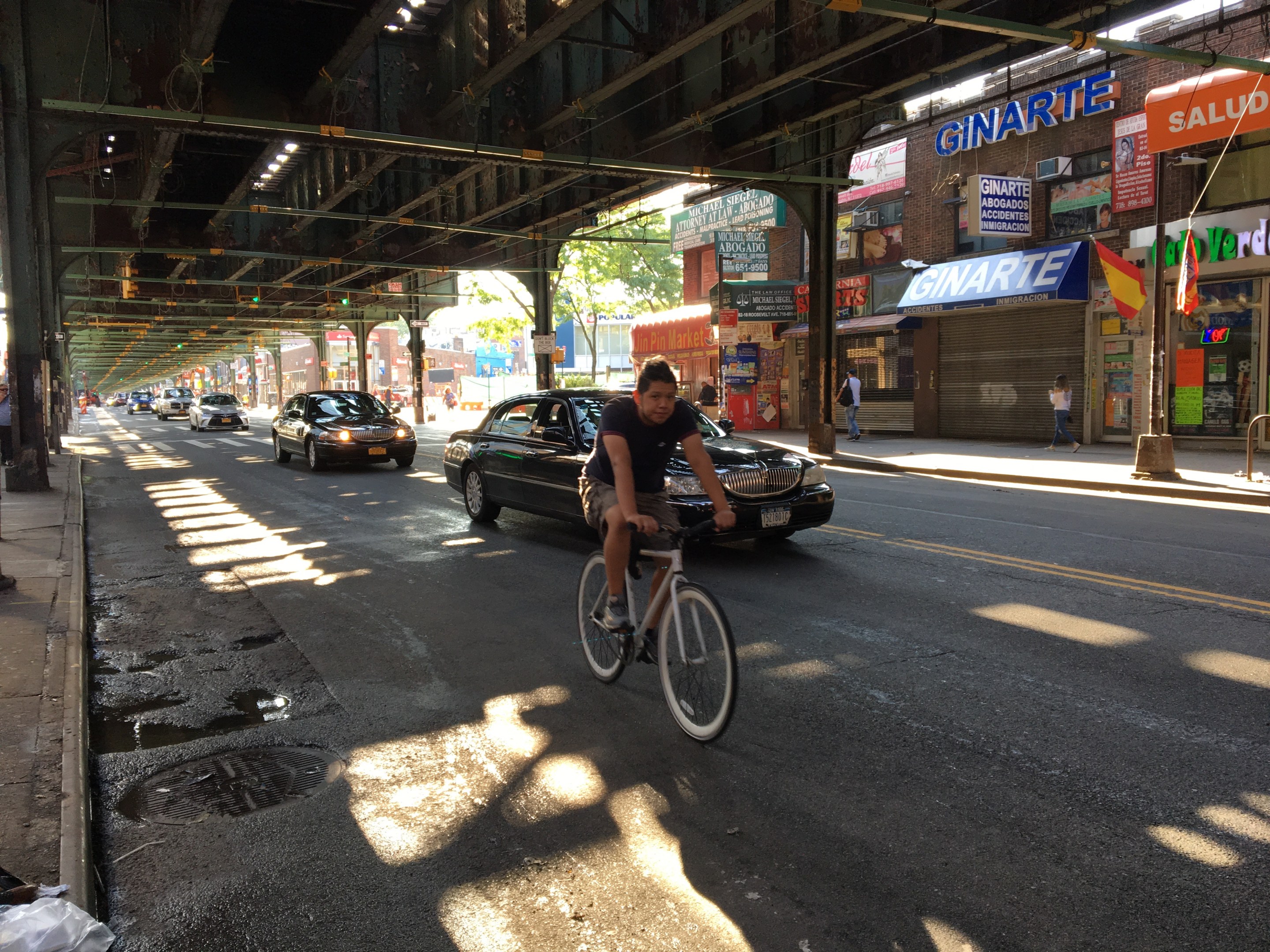The Department of Transportation has abandoned a rush-hour "no parking" program that had dramatically reduced traffic on Roosevelt Avenue after some politicians and local businesses complained that the freely moving roadway was hurting store owners.
The agency had unveiled the so-called "Clear Curbs" rush-hour parking restrictions this winter, "in an effort to develop additional tools to manage traffic congestion" — and the program largely worked in that context.
During weekday rush hours, traffic flowed so smoothly from Broadway to 90th Street that the streets often looked empty — a significant change from the unsafe, video-game feel of Roosevelt before the restrictions. The program and stepped-up enforcement completely eliminated double-parking, which endangers cyclists as they merge with cars to go around.
“It’s better for me,” delivery man Gustavo Grajales told Streetsblog. He bikes from his workplace in Sunnyside to his home in Jackson Heights.
Fellow delivery worker Manuel Lopez agreed, recounting a time he was doored by a driver on Roosevelt — a fear that didn't leave him until Clear Curbs, he said. Mayra Vega, a bike commuter, said she also felt safer with the open curb lane.
But all that open space looked like lost business to some merchants and their putative leaders.
“The streets went from congested to deserted; it looked like they were closed, like right before a street festival,” said Leslie Ramos, the executive director of the 82nd Street Partnership — but she did not mean that in a positive way.

Ramos is one of many locals who demanded that the city kill the pilot program, citing alleged loss of income by area business. She argued, without providing evidence, that Roosevelt Avenue is more important to the larger tri-state Latino community as a destination for goods and services than a thoroughfare. She argues that the city misunderstood the customers who patronize its businesses.
But Ramos may also misunderstand local traffic.
“It’s better because before it was a mess,” said Maria Rivera, who works at an employment agency on Roosevelt Avenue and said her customers arrive by train or walk. Clear Curbs has not had a tangible impact on her business, she said.
At Sebra Salon and Spa, near 80th Street, all six of the customers waiting for appointments at 6:30 p.m. on a recent weeknight had either walked or arrived by train. All seemed perplexed by the question of whether Clear Curbs was working; none was inconvenienced by it.
But the salon manager, William Albana, claimed Clear Curbs was deterring customers and that he was losing $300-$400 per day as a result of a policy that bars parking between 7 and 10 a.m. and again from 4 to 7 p.m.
Albana walks to work, as do most of the salon’s 15 employees. He said that two employees who formerly drove started taking the train when Clear Curbs went into effect. (Ramos disputed that Clear Curbs successfully moved some commuters from cars onto subways, saying, “If people can take the subway, they’re already doing it." She added that for some area workers, driving is a physical or economic necessity, though very few in the area own cars.)
As with most disputes over the proper use of public roadways, misinformation is widespread (and, indeed, business owners protested Clear Curbs even before it was implemented, suggesting that some merchants would never be objective about it). Giovanna Flores, the manager of El Pequeño Coffee Shop, claimed without evidence that her business had cratered because customers from Long Island, Connecticut and New Jersey stopped coming for her Ecuadorian breakfasts on weekday mornings.
And Andres Saavedra, the owner of a small aquarium store, claims that his sales are down at least 35 percent this year, though it is hard to see how a rush-hour parking ban would hurt business to an aquarium store that doesn't even open until 10 a.m. — after the Clear Curb morning parking restrictions end.
A spokesperson from the Department of Transportation said the agency "will adjust the Clear Curbs pilot moving forward while continuing to explore other ways to address congestion on our streets." That said, the program remains in effect in several other congested areas of the city, with DOT only altering it on Roosevelt.
It was “extremely aggressive and disrespectful,” Ramos said of Clear Curbs. “Our streets are not just about cars and bikes, they’re about people’s livelihoods. If they saw how people use the street and not just the traffic patterns, they would’ve come up with a different policy.”
Yet even Ramos admitted that congestion can also hurt a business's bottom line.
“The police should now enforce double-parking,” Ramos said. “We don’t want all enforcement to go away.”






